- Home
- Jeff Lindsay
Double Dexter Page 2
Double Dexter Read online
Page 2
We lead him into the kitchen and stop to let him stand for a few silent seconds and we stay close behind him with a taut hand on his noose and he clenches his fists and then wiggles his fingers and then he clears his throat again. “Please,” he whispers, in a ruined voice that has already gone on ahead of him into death.
“Yes,” we say with all our calm patience lapping at the edges of a wild shoreline of joy—and it may be that he thinks he hears some hope in that smooth anticipation because he shakes his head, just a little bit, as if he could persuade the tide to go backward.
“Why,” he croaks. “It’s, it’s, just … why?”
We pull the line very tight around his throat and watch as his breath stops and his face goes dark and he drops once more to his knees and just before he goes off into unconsciousness we loosen the line, just a little bit, just enough for a small cloud of air to roll into his lungs through his ravaged throat and bring him back up into his eyes, and we tell him all of it, with full and joyful truth. “Because,” we say. And then we pull the noose tight again, tighter, very tight, and we watch happily as he slides down the long slope into airless sleep and flops over onto his now-dark-purple face.
We work quickly now, arranging everything just right before he can wake up and spoil things. We get our small bag of toys and tools from the car and pick up the manila folder he dropped onto the car’s seat and we go quickly back to the kitchen with these things. Very soon Valentine is taped in place on the counter with his clothing cut away and his mouth sealed shut and around him we have arranged the pretty photos we found in his folder, lovely shots of small boys at play, laughing at a clown in a few of them, in others simply holding a ball or riding a swing. And three of them are placed oh-so-carefully in just the right place so he has to see them, three simple portrait shots taken from the newspaper stories of three small boys who had been found dead in a canal.
And as we finish making everything just right, just the way it has to be, Valentine’s eyelids flutter. For a moment he lies still, perhaps feeling the warm air on his naked skin and the tight unyielding duct tape holding him motionless, and perhaps wondering why. Then he remembers and his eyes slam open and he tries impossible things, like breaking the duct tape or taking large breaths or screaming out of a carefully sealed mouth loud enough for anyone else in his receding world to hear. None of this can happen, not ever again, not for him. For Valentine, only one small thing is possible at all, only one unimportant, meaningless, wonderful, necessary thing, and now it will start to happen, now, whatever futile flopping struggles he might try.
“Relax,” we say, and we put a gloved hand onto his bare and heaving chest. “Soon it will all be over.” And we mean all of it, everything, every breath and blink, every leer and chuckle, every birthday party and balloon animal, every hungry trip into the dusk in the wake of a small and helpless boy—all over, forever, and soon.
We pat his chest. “But not too soon,” we say, and the cold happiness of that simple truth floods up through us and into our eyes and he sees it and perhaps he knows for sure and perhaps he still feels stupid impossible hope. But as he melts back onto the counter in the tight unbreakable grip of the tape and the stronger need of this delirious night, the beautiful music of the Dark Dance begins to rise around us and we go to work, and for Valentine all hope washes away forever as that one essential thing begins to happen.
It starts slowly—not tentative, not out of uncertainty, not at all, but slowly so it will last. Slowly to draw out and relish each well-planned well-rehearsed often-practiced stroke and bring the clown slowly to the point of final understanding: a clear and simple insight into how it ends for him, here, now, tonight. Slowly we paint for him a true portrait of how it must be, stroking strong dark lines to show that this is all there will ever be. This is his very last trick, and now, here, tonight, he will slowly, carefully, meticulously, slice by slice and piece by piece, pay the toll to the happy bridge keeper with the bright blade, and slowly cross that final span into an unending darkness that he will soon be very willing, even very anxious, to join, because by then he will know that it is the only way out of the pain. But not now, not yet, not too soon; first we have to get him there, get him to the point of no return and just beyond it to where it is oh-so-clear to him that we have arrived at the edge and he can never go back. He must see that, understand that, absorb that, accept it as right and necessary and immutable, and it is our happy task to take him there and then point back to the border at the edge of the end and say, See? This is where you are now. You have crossed over and now it all ends.
And so we go to work, with the music rising around us and the moon peeking in through a rift in the clouds and chuckling happily at what it sees, and Valentine is very cooperative. He pitches and hisses and hurls out muffled squeals as he sees that what is happening can never be undone, and it is happening so very thoroughly to rapidly disappearing him, Steve Valentine, Puffalump the clown, the funny happy man in whiteface who really and truly loves kids, loves them so much and so often and in such a very unpleasant way. He is Steve Valentine, party clown, who can take a child through the whole magic rainbow of life in one dark hour, all the way from happiness and wonder into the final agony of hopelessly fading sight and the dirty water of a handy canal. Steve Valentine, who was far too clever for anyone ever to make him stop or prove what he has done in a court of law. But he is not in a court of law now, and he never will be. Tonight he lies upon the bench in the Court of Dexter, and the final verdict gleams in our hand, and there is no access to court-appointed lawyers where he is going and no appeal will ever be possible.
And just before the gavel falls for the very last time we pause. A small and nagging bird has perched on our shoulder and chirped its troubled song: Cher-wee, cher-woo, it must be true. We know the song and we know its meaning. It is the song of the Code of Harry, and it says that we have to be sure, have to be certain that we have done the right thing to the right person, so the pattern will be complete and we can finish with pride and joy and feel the satisfied rush of fulfillment.
And so at the place where breath comes slow and very hard for all that is left of Valentine and the final light of understanding is in his red and swollen eyes, we pause, lean over, and turn his head to face the pictures we have placed around him. We rip up one corner of the tape on his mouth and it must hurt, but it is such a very small pain compared to what he has been feeling for so long now that he makes no sound at all beyond a slow hiss of air.
“See them?” we say, shaking his wet slack chin and turning his head to make sure he sees the pictures. “See what you have done?”
He looks, and he sees them, and a tired smile twitches onto the uncovered part of his face. “Yes,” he says, in a voice that is half-muffled by the tape and shattered by the noose but still sounds clear when he sees. He is drained of hope now, and every taste of life has faded from his tongue, but a small and warm memory tiptoes across his taste buds as he looks at the pictures of the boys he has taken away. “They were … beautiful.…” His eyes wander over the pictures and stay there for a long moment and then they close. “Beautiful,” he says, and it is enough; and we feel so very close to him now.
“So are you,” we say, and we push the tape into place over his mouth and go back to work, winding up into well-earned bliss as the climax of our sharp symphony blares up out of the cheerful growing moonlight, and the music takes us higher and higher until finally, slowly, carefully, joyfully, it comes to its final triumphant chord and releases everything into the warm wet night: everything. All the anger, unhappiness and tension, all the cramped confusion and frustration of the everyday pointless life we are forced to trudge through just to make this happen, all the petty meaningless blather of trying to blend with bovine humanity—it is all gone, all of it shooting up and out and away into the welcoming darkness—and with it, trailing along like a battered and beaten puppy, all that might have been left inside the wicked, tattered husk of Steve Valentine.
Bye-bye, Puffalump.
TWO
WE WERE CLEANING UP AND FEELING THE SLOW AND tired contentment creeping into our bones as we always did, a smug and satisfied laziness at being done and done well with our very happy night of need. The clouds had rolled away and left a cheery afterglow of moonlight and we felt much better now; we always feel better afterward.
And it may be that we were not paying quite as much attention as we should have to the night around us, wrapped as we were in our satisfied cocoon—but we heard a noise, a soft and startled breath, and then the whispered rush of feet, and before we could do any more than turn toward it, the feet ran toward the back door of the darkened house, and we heard that door bump shut. And we could only follow and stare through the door’s glass jalousies in silent all-consuming dismay as a car parked at the curb leaped into life and sprinted away into the night. The taillights flare—the left one dangles at an odd angle—and we can only see that it is an old Honda, some uncertain dark color, with a large rust stain on the trunk that looks like a metallic birthmark. And then the car races out of sight and a cold and acid knot tightens in the pit of our stomach as the impossible, dreadful truth burns up inside us and pours out panic like the bright and awful blood from a newly opened wound.…
We have been seen.
For a long appalling minute we just stare out the door, rocked by the endless echoes of that unthinkable thought. We have been seen. Someone had come in, unheard, unnoticed, and they had seen us as we really were, standing drained and contented over the half-wrapped leftovers. And they had very clearly seen enough to recognize the odd-shaped pieces of Valentine for what they were, because whoever it was had left in a lightning-fast panicked gallop and vanished into the night before we could do more than take a breath. They had seen—they might even have seen our face; in any case they had seen enough to know what they were looking at, and they had raced away to safety—and probably to call the police. They would be calling right now, sending patrol cars to scoop us up and put us away—but here we stood, frozen into dumb astonished inaction, gaping and drooling at the place where the taillights had disappeared, stuck in stupid incomprehension like a child watching a familiar cartoon dubbed into a foreign language. Seen … And at long last, the thought gives us the jolt of fear we need to galvanize us into action, kick us into high gear, and send us racing through the last stages of cleanup and out the door with the still-warm bundles of all we have done this once-fine night.
Miraculously, we make it away from the house and off into the night and there are no sounds of pursuit. No sirens wail their warning; no squealing tires or crackling radios rip the darkness with their threats of Descending Doom for Dexter.
And as I finally, tensely, vigilantly made my way out of the area, the blather-headed numbness of that single shattering thought came back and roiled through me like the never-ending rattle of waves on a rocky beach.
We had been seen.
The thought stayed with me as I disposed of the leftovers—how could it not? I drove with one eye on the rearview mirror, waiting for the blinding burst of blue light to flare at my bumper and the brief harsh whoop! of a siren. But nothing came; not even after I ditched Valentine’s car, climbed into mine, and drove carefully home. Nothing. I was left entirely at liberty, all alone, pursued only by the demons of my imagination. It seemed impossible—someone had seen me at play, as plainly as it was possible to be seen. They had looked at the carefully carved pieces of Valentine, and the happy-weary carver standing above them, and it would not take a differential equation to arrive at a solution to this problem—A plus B equals a seat in Old Sparky for Dexter, and someone had fled with this conclusion in perfect comfort and safety—but they had not called the police?
It made no sense. It was crazy, unbelievable, impossible. I had been seen, and I had walked away from it consequence-free. I could not really believe it, but slowly, gradually, as I parked my own car in front of my house and just sat for a moment, Logic came back from its too-long vacation on the island of Adrenaline, and I sat hunched over the steering wheel, and communed once more with sweet reason.
All right, I had been seen in flagrante iugulo and had every right to expect that I would be instantly outed and arrested. But I hadn’t been, and now I was home, evidence disposed of, and nothing remained to tie me to the happy horror in the abandoned house. Someone caught a very quick glimpse, yes. But it had been dark in there—probably too dark to make out my face, especially in one brief, terrified glance, with me turned half away. There was no way to connect the shadowy figure holding the knife with any actual person, living or dead. Tracing the license plate of Valentine’s car would only turn up Valentine, and I was reasonably sure he would not answer any questions, unless somebody was willing to use a Ouija board.
And in the incredibly unlikely event that my face was recognized and a wild accusation was made against me, they would find no evidence at all, only a man with a sterling reputation as a member of the Law Enforcement Community who could certainly stand on his dignity and scoff at these absurd allegations. Absolutely no one in their right mind would believe that I could possibly have done anything of the kind—except, of course, for my very own personal nemesis, Sergeant Doakes, and he had nothing at all on me except suspicion, which he’d had for so long that it was almost comforting.
So what remained? Aside from a dubious dark and partial glimpse of my features, what could anyone possibly have seen that might prove awkward to my ambitions for remaining at liberty?
The wheels and levers in my mighty brain clicked, whirled, and spat out their answer: Absolutely Nothing.
I could not possibly be connected to anything that some shadowy, frightened someone had seen in a dark abandoned house. It was an inescapable conclusion, pure deductive logic, and there was no way around it. I was home free, and I would almost certainly remain that way. I took a very deep breath, wiped my hands on my pants, and went into my house.
It was quiet inside, of course, since it was so very late. The sound of Rita’s gentle snoring drifted down the hall to me as I peeked in at Cody and Astor; they were asleep, unmoving, dreaming their small and savage dreams. Farther down the hall, into my bedroom, where Rita lay fast asleep and Lily Anne was curled up in her crib—wonderful, improbable Lily Anne, the one-year-old center of my new life. I stood looking down at her and marveling, as always, at the soft perfection of her face, the miniature beauty of her tiny fingers. Lily Anne, the beginning of all that is good about Dexter Mark II.
I had risked all that tonight. I had been stupid, wildly thoughtless, and almost paid the price—capture, imprisonment, never again to cradle Lily Anne in my arms, never to hold her hand as she tottered through her first steps—and, of course, never again to find some well-deserving friend like Valentine and take him out to the Dark Playground. It was far too much to risk. I would have to lie low and be very well behaved until I was absolutely sure I was in the clear. I had been seen; I had brushed up against the flowing skirts of that old whore Justice, and I could not take that chance again. I must drop Dark Dexter’s Delights and let my Dex Daddy disguise morph into the real me. Perhaps this time it would be a permanent hiatus; did I really need to take such awful risks just to do these dreadful-wonderful things? I heard a soft and sated chuckle of mockery rise from the Dark Passenger as it slithered down into rest. Yessss, you do, it hissed with sleepy satisfaction.
But not for a while; tonight would last, would have to last; I had been seen. I climbed into bed and closed my eyes, but the brainless worries of capture scurried back into my mind. I batted at them, swept them away with the broom of logic; I was perfectly safe. I could not be identified, and I had left no evidence anywhere that could ever be found, and reason insisted that I had gotten away with it. All was good—and even though I still did not quite believe it, I finally drifted off into anxious, dreamless sleep.
Nothing that happened at work the next day gave any indication that there was anything at all to worry
about. Things were quiet in the forensics lab of the Miami-Dade Police Department when I arrived at my job, and I took advantage of the morning stupor to fire up my computer. A careful check of last night’s duty logs revealed that no frantic call for help had come in with reference to a maniac and a knife in an abandoned house. No alarm had sounded, no one was looking for me, and if it had not happened by now it was not going to happen at all. I was in the clear—so far.
Logic agreed with the official record; I was perfectly safe. In fact, Logic said this to me countless times over the next few days, but for some reason my lizard brain would not listen. I found myself hunched over at work, raising my shoulders against a blow that never fell—that I knew would never fall, but I anticipated it anyway. I woke up at night and listened for the sounds of the Special Response Team scuffling into place around the house.…
And nothing happened; no sirens came in the night. No knock on the door, squeal of bullhorn, demands that I come out with my hands up—nothing at all. Life steamed along on its well-oiled tracks, with no one calling for Dexter’s head, and it began to seem like some cruel invisible god was taunting me, mocking my watchfulness, sneering at my pointless apprehension. It was as if the whole thing had never happened, or my Witness had been consumed by spontaneous combustion. But I could not shake the thought that something was coming to get me.
And so I waited, and my jitters grew. Work became a painful test of endurance, sitting at home each night with my family was an annoying chore, and in short, all the zing and zest had fled from Dexter’s life.

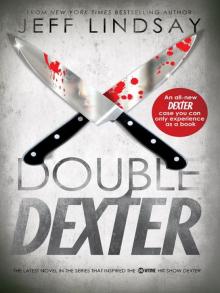 Double Dexter
Double Dexter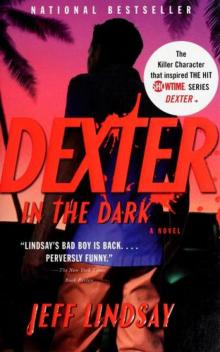 Darkly Dreaming Dexter
Darkly Dreaming Dexter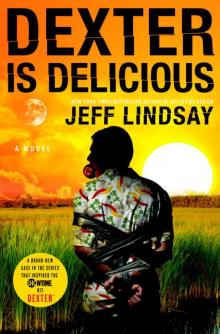 Dexter Is Delicious
Dexter Is Delicious Tropical Depression
Tropical Depression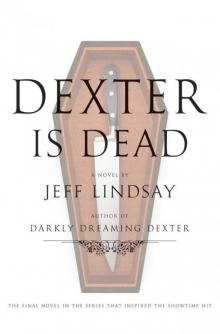 Dexter Is Dead
Dexter Is Dead Dexter's Final Cut
Dexter's Final Cut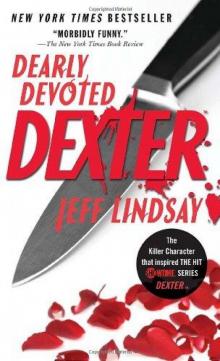 Dearly Devoted Dexter
Dearly Devoted Dexter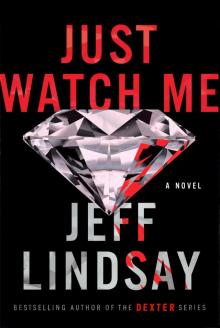 Just Watch Me
Just Watch Me Red Tide
Red Tide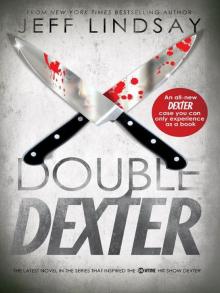 Double Dexter: A Novel
Double Dexter: A Novel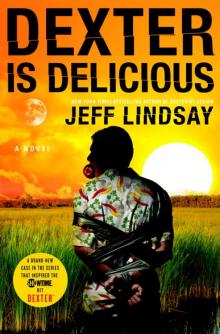 Dexter is Delicious: A Novel
Dexter is Delicious: A Novel Dexter's Final Cut d-7
Dexter's Final Cut d-7